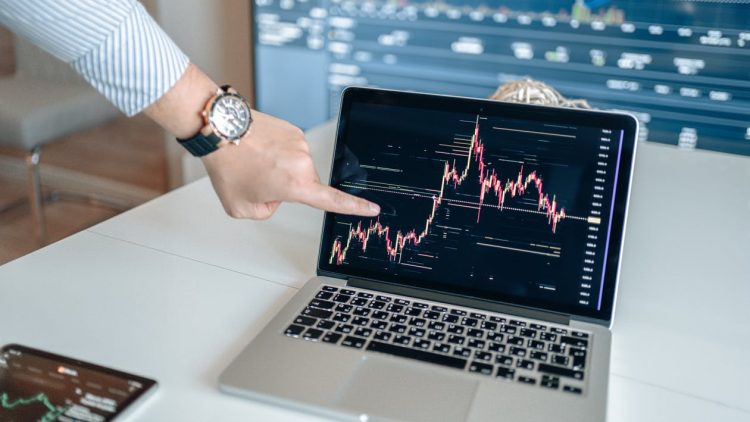Forex, also known as foreign exchange, FX, or currency trading, is a decentralized global market where all the world’s currencies trade. The forex market is the largest, most liquid market globally, with an average daily trading volume exceeding $5 trillion. All the world’s combined stock markets don’t even come close to this. But what does that mean to you? Take a closer look at forex trading, and you may find some exciting trading opportunities unavailable with other investments.
The foreign exchange market (forex, FX, or currency market) is a global decentralized or over-the-counter (OTC) market for the trading of currencies. You can easily access it with CFI’s MT5 trading platform. This market determines foreign exchange rates for every currency. It includes all aspects of buying, selling, and exchanging currencies at current or determined prices. In terms of trading volume, it is by far the largest market globally, followed by the credit market.
The main participants in this market are the larger international banks. Financial centers worldwide function as anchors of trading between a wide range of multiple types of buyers and sellers around the clock, except for weekends. Since currencies are always traded in pairs, the foreign exchange market does not set a currency’s absolute value but rather determines its relative value by setting the market price of one currency if paid for with another. Ex: 1 USD is worth X CAD, or CHF, or JPY, etc…
The foreign exchange market works through financial institutions and operates on several levels. First, behind the scenes, banks turn to a smaller number of financial firms known as “dealers” involved in large quantities of foreign exchange trading. Most foreign exchange dealers are banks, so this behind-the-scenes market is sometimes called the “interbank market” (although a few insurance companies and other financial firms are involved). Trades between foreign exchange dealers can be very large, involving hundreds of millions of dollars. Because of the sovereignty issue involving two currencies, Forex has little (if any) supervisory entity regulating its actions.
The pros and cons of forex trading
The pros and cons of forex trading are pretty evenly balanced. On the one hand, it’s a very liquid market with high leverage and 24-hour trading. That can make it attractive to those who want to make quick profits. But, on the other hand, it’s a volatile market with big swings that can be difficult to predict. So, what’s the verdict? Is forex trading right for you?
Here are some things to consider:
The Pros of Forex Trading
– Liquidity: The forex market is huge, with a daily turnover of around $5 trillion. That means there are always buyers and sellers so that you can get in and out of trades quickly and easily.
– Leverage: Forex brokers offer high levels of leverage, up to 400:1 in some cases. That means you can control a $100,000 position with just $250 of your own money. But, of course, leverage also magnifies losses, so you need to be careful.
– 24-hour trading: The forex market is open 24 hours a day, from Sunday evening to Friday night. That means you can trade when it suits you, regardless of the time zone.
The Cons of Forex Trading
– Volatility: The forex market is notoriously volatile, with big swings that can be difficult to predict. Those swings can hit your stop-loss orders and take your account into the red before knowing what’s happening.
– Margin calls: If your account falls below the margin requirements of your broker, you’ll get a margin call. As a result, you’ll need to deposit more money or close out some of your losing positions.
– Currency risk: When you trade in the forex market, you’re always exposed to the risk of currency fluctuations. For example, if you’re long on the EUR/USD pair and the euro weakens, you’ll make a loss.
So, those are some things to consider before deciding whether forex trading is right for you. It’s a risky business, but it can be profitable if you know what you do. Just be sure to do your homework before you start trading.
How forex trading works
Forex trading is buying and selling currencies on the foreign exchange market. The foreign exchange market is a decentralized global market for trading currencies. This market determines the foreign exchange rates for all currencies. It includes all aspects of buying, selling, and exchanging currencies at current or determined prices. In terms of trading volume, it is by far the largest market globally, followed by the credit market.
The main participants in this market are the larger international banks. Financial institutions trade currency for several reasons, including balancing their portfolios, facilitating international trade and investment, or speculative trading to make a profit.
Currency trading was once only available to large financial institutions and corporations but has become more accessible to retail investors. Retail investors can trade currency through online brokers.
The forex market
The forex market is one of the most exciting and potentially lucrative markets globally. But what is Forex? The foreign exchange market, or Forex, is where international currencies are traded. Currencies are important to most people worldwide because they need them to buy goods and services. Therefore, the better a country’s currency is doing, the more attractive it is for foreigners to invest in that country.
The foreign exchange market is where currencies are traded. Currencies are important to most people worldwide because they need them to buy goods and services. The foreign exchange market is also known as the FX, currency, or simply Forex. It is one of the largest markets in the world, with a daily turnover of over $5 trillion.
The market is open 24 hours a day, five days a week, so the action occurs. The term ‘forex’ is an abbreviation for ‘foreign exchange.’ Therefore, it is sometimes called the FX market or currency market.

